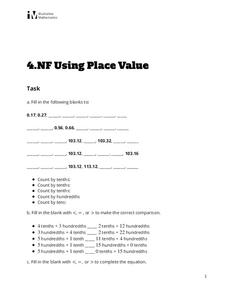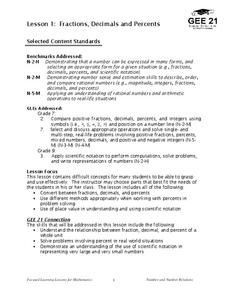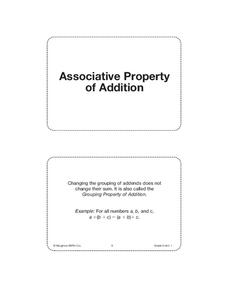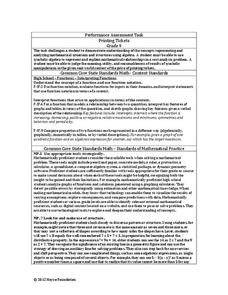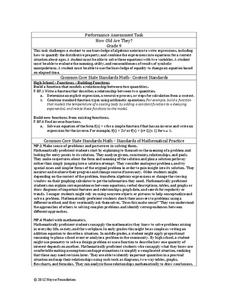EngageNY
Multiplication of Numbers in Exponential Form
Develop a solid understanding of multiplication and division properties of exponents. Individuals expand exponential terms to discover the patterns and create the properties in the second installment in a series of 15. The activity...
EngageNY
Exponential Notation
Exponentially increase your pupils' understanding of exponents with an activity that asks them to explore the meaning of exponential notation. Scholars learn how to use exponential notation and understand its necessity. They use negative...
Diablo Valley College
The Language of Sets and Set Notation
The basics of number theory and set notation are explained in a highly approachable way in a self-contained instructional activity and worksheet. Introducing the vocabulary and concepts from ground zero and building to more complex...
EngageNY
Writing Division Expressions
Express division using different expressions. Individuals learn to write division expressions both with and without the division symbol in the 13th lesson of a 36-part series. They consider both numerical and algebraic expressions...
Illustrative Mathematics
Using Place Value
Learners count by tenths, hundredths, or tens in a task that uses decimal place value strategies. The young mathematicians then use <, >, or = to make correct comparisons between expanded decimal notations.
EngageNY
Proofs of Laws of Exponents
Apply pupil understanding of exponent properties to prove the relationships. In the sixth lesson of the series, individuals are expected to prove relationships using mathematical statements and reasoning.
EngageNY
Exploiting the Connection to Cartesian Coordinates
Multiplication in polar form is nice and neat—that is not the case for coordinate representation. Multiplication by a complex number results in a dilation and a rotation in the plane. The formulas to show the dilation and rotation are...
EngageNY
Numbers in Exponential Form Raised to a Power
Develop an understanding of the properties of exponents through this series of activities. This third lesson of 15 explores the patterns associated with the power property. Scholars expand the powers before applying the property.
Virginia Department of Education
Logic and Conditional Statements
If there is a conditional statement, then there is a hypothesis and conclusion. Pupils learn how to identify the parts of conditional statements. Class members continue to work with conditional statements and rewrite them in their many...
Louisiana Department of Education
Fractions, Decimals, and Percents
Fractions, decimals, and percents all say the same thing! Show your classes how to convert between the three forms using visual and numeric representations. Then lead them to an understanding of scientific notation.
EngageNY
Getting a Handle on New Transformations 1
In the first of a two-day lesson on transformations with matrix notation the class transforms the unit square using general transformations, then calculates the area of the transformed image. They discover it is the same as finding...
EngageNY
Writing and Expanding Multiplication Expressions
Find out what's so standard about standard form. Scholars learn to write multiplication expressions with variables in the 10th lesson in a series of 36. They use different symbols for multiplication and translate between standard and...
EngageNY
Read Expressions in Which Letters Stand for Numbers III
Those key operation words sure come in handy. Groups continue their work with converting between different notations for algebraic expressions. They work in stations to write the symbolic form for given verbal phrases. This is the 17th...
Curated OER
Comparing Fractions with the Same Denominator, Assessment Variation
A short, multiple choice assessment that determines your 3rd graders' ability to correctly compare fractions with like denominators. This quiz asks learners to compare two fractions using words, the greater than/less than symbols, and...
EngageNY
Definition of Congruence and Some Basic Properties
Build a definition of congruence from an understanding of rigid transformations. The lesson asks pupils to explain congruence through a series of transformations. Properties of congruence emerge as they make comparisons to these...
EngageNY
Solution Sets for Equations and Inequalities
How many ways can you represent solutions to an equation? Guide your class through the process of solving equations and representing solutions. Solutions are described in words, as a solution set, and graphed on a number line....
Houghton Mifflin Harcourt
Unit 1 Math Vocabulary Cards (Grade 5)
Associative property of addition, exponents, and variables are a few of the terms that a set of flash cards includes and are designed to support math vocabulary instruction. Cards offer a a bold-faced font as well as a thorough...
EngageNY
Multiplying and Dividing Expressions with Radicals
That's radical! Simplifying radicals may not be exciting, but it is an important skill. A math lesson provides explanations of properties used throughout the material. Scholars practice skills needed to multiply and divide...
Mt. San Antonio Collage
Circles
Don't circle around the topic, but get right to the center with tons of practice regarding circles in geometry. The note-incorporated worksheet provides guided practice through many topics such as central angles, inscribed polygons...
Inside Mathematics
Printing Tickets
Determine the better deal. Pupils write the equation for the cost of printing tickets from different printers. They compare the costs graphically and algebraicaly to determine which printer has the best deal based upon the quantity of...
Curated OER
Comparing Fractions with the Same Numerators, Assessment Variation
Have your class demonstrate their ability to compare fractions with this short multiple-choice assessment. Using the fractions 9/8 and 9/4, the students first make comparisons using both words and the greater than/less than signs. Next,...
Inside Mathematics
Magic Squares
Prompt scholars to complete a magic square using only variables. Then they can attempt to solve a numerical magic square using algebra.
Inside Mathematics
How Old Are They?
Here is a (great) lesson on using parentheses! The task requires the expression of ages using algebraic expressions, including the distributive property. Pupils use their expressions to determine the individual ages.
Inside Mathematics
Conference Tables
Pupils analyze a pattern of conference tables to determine the number of tables needed and the number of people that can be seated for a given size. Individuals develop general formulas for the two growing number patterns and...




